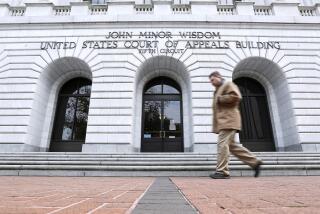DreamHost considers fighting order to cough up info on visitors of anti-Tump website
- Share via
Executives from a Los Angeles-based tech company said they are weighing whether to fight a judge’s order to provide prosecutors with email addresses and other information from people who visited an anti-Trump website in the months leading to Inauguration Day.
The company, DreamHost, filed a motion with District of Columbia Superior Court Judge Robert E. Morin last week requesting that he put his order on hold while they consider whether to appeal.
But prosecutors, concerned that such a delay could hinder their cases against dozens charged in Inauguration Day riots, have asked the judge to force DreamHost to turn over the data immediately.
In a year where DreamHost was looking forward to celebrating its 20th anniversary, the company instead has been propelled into a high-profile privacy rights case as a result of managing the server for a website that authorities say facilitated Inauguration Day rioting.
DreamHost co-founder and co-Chief Executive Dallas Kashuba said in an interview that the potential implications go beyond this case. He said there is concern among tech companies that Internet users could become fearful of visiting websites if they know government authorities can monitor such information.
“This is a fundamental issue of online privacy and how the Internet works. If this goes the wrong way, it could detrimentally impact the Internet itself,” Kashuba said.
“If people become afraid to access websites because they may be found out,” he said, “it could chill the online communication.”
Prosecutors from the U.S. attorney’s office in the District of Columbia have filed felony rioting charges against some 200 people.
In court, they said they obtained the subpoenas seeking emails, email addresses and IP addresses of anyone who might have engaged with the alleged rioters through the website Disruptj20.org, which is hosted by DreamHost.
Orin Kerr, a computer crime law professor at George Washington University, said the case has caught national attention as observers watch how prosecutors handle concerns over constitutional rights prohibiting unreasonable searches and seizures.
“This is testing the limits of the 4th Amendment,” Kerr said. “It’s an important question of the government trying to get records that they haven’t obtained in the past.”
DreamHost is not the first Internet company to challenge the government in its quest to prosecute people associated with the riots.
On Thursday, attorneys for Facebook are scheduled to argue in front of the U.S. Court of Appeals for the District of Columbia Circuit over a court order that blocks the social media giant from letting users know when law enforcement investigators ask to search their online information, particularly their political affiliations and comments.
The Inauguration Day riots left six police officers injured and caused tens of thousands of dollars in damage. Downtown businesses were vandalized blocks from where President Trump and his family paraded after the swearing-in ceremony.
Prosecutors initially reached out to DreamHost on Jan. 27, seven days after the inauguration. At that time, prosecutors made a preservation request, asking DreamHost to save a snapshot of data on its servers. DreamHost rebuffed the government’s initial request. Then, on Feb. 8, prosecutors obtained their first court subpoena for the information they wanted, forcing DreamHost to comply.
On July 17, prosecutors filed a subpoena that the company said would have required it to turn over the IP addresses of about 1.3 million users of its site.
DreamHost objected to such a sweeping petition and requested a hearing in front of the judge. But days before the hearing, prosecutors scaled back their request to include email addresses only of people who engaged with the website by, for instance, providing their email addresses or signing up to receive information.
Prosecutors argued that their request had to be somewhat broad because until they review the data, they have no idea which users of the website may be associated with the rioting.
Judge Morin ordered DreamHost to turn over user information from the site’s inception through Inauguration Day. DreamHost said the current request involves information regarding people associated with about 10,000 email addresses.
Kashuba said he believes prosecutors are trying to charge more people in the case and are trying to use data from his company as evidence to bolster those charges.
He said DreamHost — which employs about 200 people and had revenue of about $50 million last year — has already spent about $25,000 in legal fees fighting with prosecutors over the subpoenas. To file an appeal would cost an additional $150,000.
“It does make me wonder how far they’re allowed to go,” Kashuba said. “How much of our time should be put into aiding their investigation?”
Alexander writes for the Washington Post.






